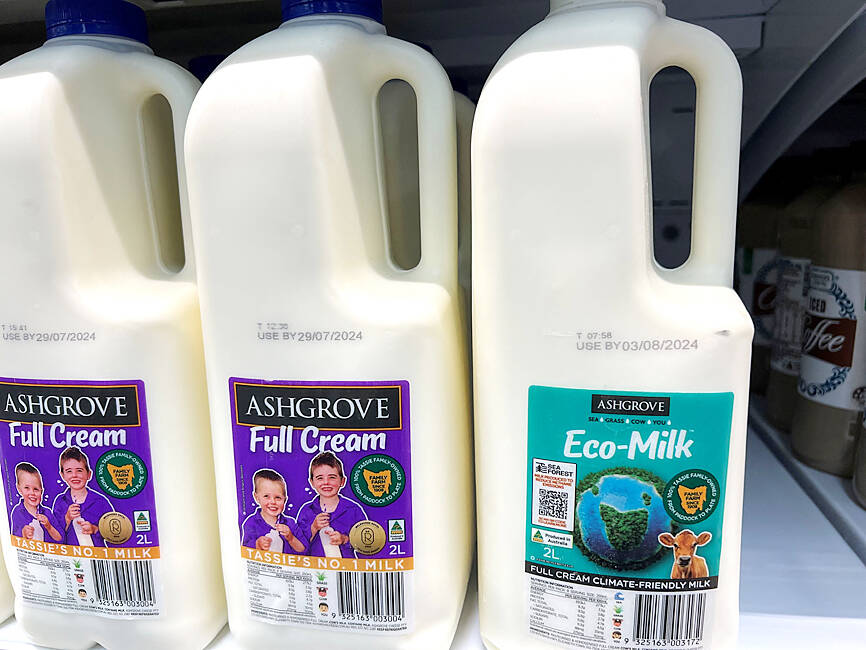A small dairy in Tasmania is stocking supermarket shelves with what it says is the world’s first branded milk produced by cows fed with a seaweed that makes them emit lower levels of environmentally damaging methane gas.
The livestock industry accounts for about 30 percent of global methane emissions, according to the UN.
Seaweed and other feed additives for cattle could reduce these greenhouse gas emissions, but have yet to be widely adopted due to cost.

Photo: Reuters
Since February, family-owned Tasmanian dairy producer Ashgrove has been feeding about 500 cows — a fifth of its total — an oil containing a seaweed extract that reduces the methane released by a cow’s digestion, co-owner Richard Bennett said.
The cows produce about 10,000 liters of milk a day, a portion of which is bottled as “Eco-Milk” and sold across Tasmania, including at Woolworths, Australia’s largest supermarket chain.
“We’re getting about 25 percent reduction in methane,” Bennett said.
Eco-Milk is a test of whether consumers will pay extra for dairy products that have a lower environmental impact.
A 2-liter bottle sells for A$5.50 (US$3.67), A$0.25 more than normal full cream milk, Bennett said, adding that sales were going well, but the company had yet to decide on whether to expand the project.
Producers of feed additives that inhibit the release of methane by microbes digesting plant matter in cows’ stomachs have invested hundreds of millions of dollars to produce enough to feed millions of animals.
French cheese maker Bel Group last year said it would feed an additive to about 10,000 dairy cows in Slovakia. Other firms, including JBS, Danone and Fonterra, have dabbled with additives, but not rolled them out at scale.
The additive used by Ashgrove is supplied by a Tasmanian company called Sea Forest. Its CEO, Sam Elsom, said he hoped Eco-Milk would be popular.
“If these products aren’t supported, things will go back to usual,” he said. “And the pace of decarbonization will be much slower.”

POLITICAL PRISONERS VS DEPORTEES: Venezuela’s prosecutor’s office slammed the call by El Salvador’s leader, accusing him of crimes against humanity Salvadoran President Nayib Bukele on Sunday proposed carrying out a prisoner swap with Venezuela, suggesting he would exchange Venezuelan deportees from the US his government has kept imprisoned for what he called “political prisoners” in Venezuela. In a post on X, directed at Venezuelan President Nicolas Maduro, Bukele listed off a number of family members of high-level opposition figures in Venezuela, journalists and activists detained during the South American government’s electoral crackdown last year. “The only reason they are imprisoned is for having opposed you and your electoral fraud,” he wrote to Maduro. “However, I want to propose a humanitarian agreement that

ECONOMIC WORRIES: The ruling PAP faces voters amid concerns that the city-state faces the possibility of a recession and job losses amid Washington’s tariffs Singapore yesterday finalized contestants for its general election on Saturday next week, with the ruling People’s Action Party (PAP) fielding 32 new candidates in the biggest refresh of the party that has ruled the city-state since independence in 1965. The move follows a pledge by Singaporean Prime Minister Lawrence Wong (黃循財), who took office last year and assumed the PAP leadership, to “bring in new blood, new ideas and new energy” to steer the country of 6 million people. His latest shake-up beats that of predecessors Lee Hsien Loong (李顯龍) and Goh Chok Tong (吳作棟), who replaced 24 and 11 politicians respectively

Young women standing idly around a park in Tokyo’s west suggest that a giant statue of Godzilla is not the only attraction for a record number of foreign tourists. Their faces lit by the cold glow of their phones, the women lining Okubo Park are evidence that sex tourism has developed as a dark flipside to the bustling Kabukicho nightlife district. Increasing numbers of foreign men are flocking to the area after seeing videos on social media. One of the women said that the area near Kabukicho, where Godzilla rumbles and belches smoke atop a cinema, has become a “real

‘WATER WARFARE’: A Pakistani official called India’s suspension of a 65-year-old treaty on the sharing of waters from the Indus River ‘a cowardly, illegal move’ Pakistan yesterday canceled visas for Indian nationals, closed its airspace for all Indian-owned or operated airlines, and suspended all trade with India, including to and from any third country. The retaliatory measures follow India’s decision to suspend visas for Pakistani nationals in the aftermath of a deadly attack by shooters in Kashmir that killed 26 people, mostly tourists. The rare attack on civilians shocked and outraged India and prompted calls for action against their country’s archenemy, Pakistan. New Delhi did not publicly produce evidence connecting the attack to its neighbor, but said it had “cross-border” links to Pakistan. Pakistan denied any connection to